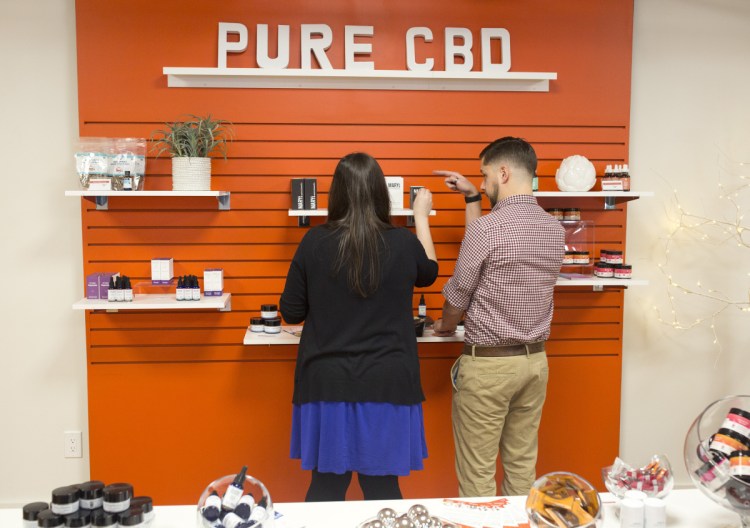In its newly remodeled Portland shop, Wellness Connection is now offering a line of boutique, limited-edition products it calls Maine Selects.
This line of smokable marijuana, edibles and concentrates will stand out from Wellness’ other offerings. Not only will the products constantly change, they may cost a little more and will be made by a small curated group of Maine caregivers who specialize in hard-to-find strains or unusual extraction methods instead of in the dispensary’s in-house cultivation and extraction facility in Auburn.
“I call it our farmers market,” said Executive Director Patricia Rosi. “Wellness will search the cannabis marketplace, visit the cultivation facilities and extraction labs, and test the products to find the best of what Maine has to offer. We will be the curators. I’m very excited about the possibilities.”
This collaboration is possible because of a new state law that went into effect last week allowing business-to-business medical marijuana sales. Previously, medical businesses had to grow and make almost everything themselves. The new law allows them to sell up to 30 percent of a harvest or inventory to each other, increasing economic opportunities for them and product selection for Maine’s 50,000 medical patients.
OPENING THE DOOR TO HEMP
The law, adopted in July over a gubernatorial veto, also enables patients to get a medical card if a doctor deems marijuana medically beneficial, eliminating state-sanctioned qualifying conditions like cancer, chronic pain or AIDS. It also grants caregivers the right to open shops and hire more than a single employee, and will grant six new medical dispensary licenses, giving Maine a total of 14, among other changes.
The wholesale provision works both ways and will allow medical dispensaries to sell their products to caregiver shops, which have been popping up around Maine over the past two years and gained legal protection in the recent medical marijuana reform law. Joe Lusardi, executive director of Maine Organic Therapy in Ellsworth, has exclusive Maine rights to a nationally known brand of vaporizer that he would like to sell to caregivers across the state.

Wellness Connection of Portland showcases some of the changes made possible by a new law in Maine that opened up economic opportunities for caregivers and medical marijuana dispensaries.
“There’s always been this us-versus-them mentality in the business, caregiver versus dispensary, dispensary versus caregiver, but I hope this wholesale thing can bring us together,” Lusardi said. “That way we don’t waste so much time bickering with each other. Instead, we can work together, grow everybody’s business and make sure patients have access to the best products available.”
This new wholesale option also opens the door, literally, for Wellness to invite the general public into its Portland shop for the first time to purchase hemp products. Hemp is cannabis that is high in CBD, a compound with therapeutic benefits, but has less than 1 percent THC, the compound that makes a user feel stoned. Customers can buy hemp without a medical marijuana card, but need a doctor’s permission before they can buy marijuana.
Before the new wholesale provision, Wellness was limited in how much CBD product it could stock because it doesn’t grow hemp in its Auburn facility. Its selection of CBD products was so small that it was located in the lobby of the dispensary, the area where employees screen walk-ins to make sure they have the medical card and ID necessary to gain access to the marijuana sales floor.
It was not an ideal location, Rosi said, for the canna-curious to learn about the health benefits of marijuana’s non-psychoactive cousin.
HEMP FARMING EXPECTED TO GROW
But the new law makes it possible for Wellness to buy more hemp products and expand its CBD line, which Rosi thinks could grow to as much as 20 percent of its total sales. As part of a remodel, Wellness decided to bring its expanded CBD section inside its dispensary. This physical change allows Wellness to open its door to another million or so Maine adults who don’t have medical marijuana cards, growing their potential CBD customer base by a factor of 20.
“Maine is really proud of ‘made in Maine’ and now we can promote that,” Rosi said. “I’m happy to finally be able to offer more than what I produce. I cannot do it all.”
There is nothing to stop CBD customers from browsing the marijuana shelves, Rosi said. Those without medical cards cannot buy marijuana yet, but they should be able to sometime next year, when Maine begins to license recreational marijuana stores. Wellness Connection wants to jump into the adult-use market, and would like to bring those CBD customers along when it does, Rosi said.
Lusardi said Maine Organic Therapy plans to expand into CBD products, too, but was waiting on Congress to classify hemp as an agricultural commodity and yank it from the federal controlled-substances list. That happened last week when Congress approved the $867 billion farm bill. This will expand Maine’s hemp farming, which had been operating under a pilot program. Hemp is expected to mushroom into a $20 billion U.S. industry by 2022.
“We’re still a couple weeks out, but we’ll get there,” Lusardi said. “We have to go slow, but the CBD market is big. It’s definitely something we need to be doing.”
Penelope Overton can be contacted at 791-6463 or at:
poverton@pressherald.com
Twitter: PLOvertonPPH
Send questions/comments to the editors.




Comments are no longer available on this story